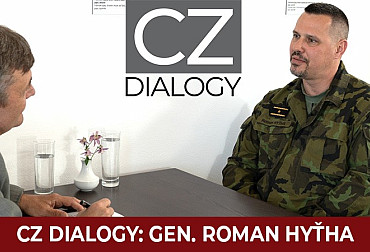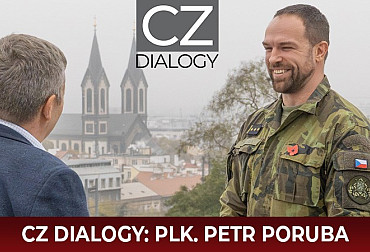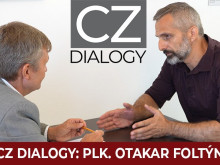Gen. Karel Řehka: The Army has skilled people, but it also has huge deficits from the past
In an interview with the Chief of the General Staff of the Army of the Czech Republic, Major General Karel Řehka, we discussed the current armed conflict in Ukraine, the need to improve and modernize assets in response to new changes in the security situation, we also addressed cyberspace, which is increasingly interconnected with real battlefields, and we did not forget about the Active Reserve and its importance for the Army.
Video: Interview with the Chief of the General Staff of the Army of the Czech Republic, Major General Karel Řehka / CZ DEFENCE
Let us first introduce the Chief of General Staff. Major General Karel Řehka is a graduate of the Military University of Land Forces in Vyškov. In 1996 he completed a one-year officer course at the Royal Military Academy in Sandhurst, UK, as a foreign cadet. During his military service he completed missions in Kosovo and Afghanistan. He was Deputy Commander of the Multinational Division North-East in Elblag, Poland, under which the Allied Rapid Reaction Forces forward deployed to Poland and the Baltic States fall. From 2010 to 2014, he was the commander of 601st Special Forces Group "General Moravec". And he was off active military duty from 2020 to 2022, when he became the Director of the National Cyber and Information Security Bureau (NUKIB). General Řehka took over as Chief of General Staff on July 1 this year. Therefore, we took the opportunity to ask the General what his experience has been during his six months in charge of the Czech Army, how the necessary purchases of new combat equipment are progressing, how important the Active Reserve is for the Army, and more.
According to General Řehka, the current armed conflict in Ukraine shows that it is no longer a classic conventional war. "Unmanned aerial vehicles are being used massively, electronic warfare is being used. These are all stimuli for new equipment and visions of our army for the future. There are three areas in which we need to work intensively. The first is to modernize the Army so that it can keep up in all components such as intelligence information support, command, control and fire support, mobility and logistics, sustainability, force protection. These are all things the Army needs to modernise," the Chief of General Staff said in an interview. Of course, personnel readiness is also a component, which is unsustainable in the long term, according to Řehka. The Army is ageing and some soldiers are leaving the service. This needs to change. The third important area, according to Gen. Řehka is "cultivation of the strategic environment". This means an end to the false and unproductive debates about the needs of the army, when a serious professional discussion must begin, which will lead to a quality, combat-ready army.
 Picture: In the next episode of our discussion show CZ DIALOGY we invited the Chief of the General Staff of the Army of the Czech Republic, Major General Karel Řehka | Michal Pivoňka / CZ DEFENCE
Picture: In the next episode of our discussion show CZ DIALOGY we invited the Chief of the General Staff of the Army of the Czech Republic, Major General Karel Řehka | Michal Pivoňka / CZ DEFENCE
General Řehka is also clear whether the person of the Chief of General Staff, as the most exposed person in the Army, is still a soldier or a politician. "Well definitely a soldier. In any case, the Chief of General Staff cannot be a politician because he has to give military recommendations to politicians, and those recommendations have to be fair and professional. Ultimately it is the politicians' decision what, how and when to procure, but the Chief of the General Staff must always be a soldier." However, according to Řehka, it is important for the Chief of the General Staff to perceive politics and should be able to evaluate it in the context of its defence tasks, because in the final analysis politics and defence cannot be completely separated. However, the Chief of General Staff must definitely not be a politician, Gen. Řehka said.
The Czech Army's construction concept is going to be revised, but it will not be a 180-degree turn, but rather an improvement and modernisation of means depending on new changes in the security situation. "You need new vehicles, you need new IFVs, you need to have functional logistics and so on," the major general summarised. According to Řehka, we are in a real threat: "I don't want to spread panic, but we have not been this close to a threat for a long time. We need to remind ourselves of that." So we have to take into account that the Czech Republic can become a participant in a conflict in a moment, which should be taken seriously and realistically.
Another topic that is increasingly appearing in various discussions about battlefields and conflicts is cyberspace, which is more and more often linked to real battlefields. According to General Řehka, we need to realise that basically our entire space is already digitised. For example, without a functional cyberspace, the state cannot collect taxes, people cannot withdraw money from ATMs. And of course, digitisation also applies to weapon systems. So it is clear that this domain is important and its role will grow in the future, both in terms of new capabilities of weapon systems and in the ability to process huge amounts of data. With that, of course, according to the general, comes the need to protect its systems from potential attacks, and that is why part of the General Staff's job is to assess and manage cyber operations.
The Chief of the General Staff of the Army of the Czech Republic also stressed the importance of the Active Reserve for the Army. "We have been lying to ourselves here for a long time that there is no threat of a large-scale conflict in Europe. Europe has simply been lulled into peace. We ignored the warning signs, and it turned out that none of that was true," Maj. Gen. The Czech Republic would immediately become an active participant as a state and, of course, as an army in the event of a crisis in the eastern flank. In the event of such a threat, we will not only carry out our tasks on the eastern flank, but especially here at home, where we will have to provide support in the sense of a host country to the alliance troops. And a professional Army is simply not enough for that. "You need to be able to mobilise both human resources and in-kind resources quickly and effectively, and from that perspective the deployment of the Active Reserve is absolutely critical. We can use Active Reserves even in peacetime, and that is an advantage," says Řehka. After all, the integration of Active Reserves into Army structures has been underway for a long time. Right now, for example, reservists are performing tasks on the state border together with professional soldiers. Some reservists are deployed in the international NATO unit (Battlegroup) in Slovakia, and members of the Active Reserve have also been deployed in Africa and Afghanistan in the past. The army also has a history of active reserve operations in the Czech Republic, according to Gen. Řehka has already managed to overcome shortcomings in the acquisition of equipment for the Active Reserve. A complication for members of the Active Reserve is that they are often released from employment to perform military duties and training. The Chief of General Staff perceives this situation and believes that employers do not yet sufficiently appreciate the amount of experience their employees gain during training. "For example, if you want someone to manage a project team in your company or something like that, then military command experience just comes in handy," the major general added.





















